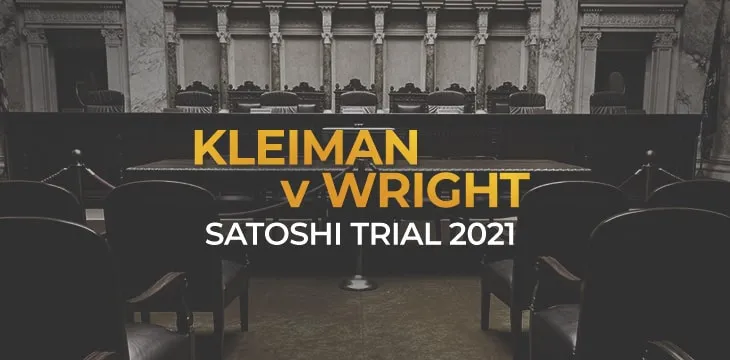|
Getting your Trinity Audio player ready...
|
The jury in the history-making Kleiman v Wright trial is still deliberating on a verdict, and their decision could change both Bitcoin’s future and perceptions of its past. The amounts of money in question could reach hundreds of billions of dollars, setting a new record for personal litigation. Why is it taking so long to decide, and what could be going through the jurors’ minds?
This case has involved so many complex issues, and one could easily feel sorry for the jury members who’ve had this situation thrust upon them. Even for seasoned Bitcoin veterans, it’s looked like a tangled web at times—plus there’s the bonus of document and electronic fraud accusations, computer forensics, and business-legal concepts like trusts, partnerships, contracts, and corporate roles/responsibilities.
At stake is whether or not Dr. Craig Wright had a legally binding partnership with his friend, the late Dave Kleiman. If the jury decides this is true, they need to choose an appropriate amount of compensation, plus any punitive damages.
‘Lawyer You Know’ explains the situation.
Speaking to Kurt Wuckert Jr. in CoinGeek’s latest Kleiman vs. Wright Special Report, Lawyer Peter Tragos of law firm Tragos, Sartes & Tragos explains that it’s not always in a plaintiff’s best interest to select a jury with advanced knowledge of the topic in question.
The prospect of “ten anybodies” making a decision that affects years of work put into the actual trial (and far more in its impact on participants’ lives and careers) “is kinda scary” even for lawyers, he says. The only expert advice they give is basic legal guidance from the judge and witnesses’ testimony. Figuring out what happens after that is entirely up to the jury members.
The plaintiffs, in this case, appeared to play for sympathy, Tragos said. They focused on Dr. Wright’s personality and behavior, while the defendant’s side tried to steer things back to legal principles.
Dr. Wright’s abrasive public personality has made him a target both on social media and in the courtroom, and even his dress sense could alter the average person’s perception of him. These factors, plus the complex details of the case, mean the plaintiffs might prefer a jury that doesn’t understand the issues—or even want to.
If the facts of the case are complex but not on your side, it’s better to play for sympathy and emotions about the sides’ “likeability.” A juror probably won’t comprehend all the issues in full, so who do they like/dislike or trust more? That could be the decider, rather than the ability to prove facts.
On the other hand, Tragos says, Ira Kleiman doesn’t come off as particularly likable either. His adopted brother died a painful and gruesome death, most likely alone and over a long time. Ira and Dave had not even spoken in the years preceding this, let alone met in person. Legally, the jury is deciding whether the money and IP belong to Dave, not Ira. However, they may decide the case based on which living person “deserves” the money and IP more than who has a legal right to them. Both sides have attempted to leverage their advantages here.
‘Unfathomable’ amounts of money
Then there’s the issue of money. The jury taking a long time to deliberate could be bad news for Dr. Wright, Tragos says. He pointed out that the dollar amounts in play here are in the millions or even billions—and the average citizen, whose income is likely U.S. $30-$100,000, would struggle to comprehend what award is appropriate.
Therefore, ruling in favor of Dr. Wright across the board would be a relatively quick decision, he adds.
“It’s just an unfathomable number,” Wuckert says. During the trial, the plaintiff’s legal team revealed they’d been monitoring posts by Dr. Wright in the members-only MetanetICU Slack channel. Wright had made comments about certain people and amounts of money involved that could have affected the outcome and raising compensation amounts the plaintiffs sought into the hundreds of billions of dollars.
Tragos notes there’s also the issue of compensatory (for losses) vs. punitive (designed to punish) damages. The latter is usually much higher in civil cases, but this is the first case he’s ever seen where the compensatory damages sought are in the hundreds of billions, and punitive only $17 billion.
Lawyers representing the plaintiff would certainly get their cut of any award, but that doesn’t mean lawyers are champing at the bit to take a case like this. As Tragos points out, there’s the risk of not getting anything at the expense of devoting your practice’s time and effort to it for years. On the other hand, achieving a victory and award of only $5 billion would guarantee money and prestige well into the future.
What happens if the jury finds in the plaintiff’s favor? Even a finding against Dr. Wright could prove his claim to be Satoshi Nakamoto—he has stated that moving Satoshi’s coins would require a court order. A losing defendant typically has 30 days to pay up, though given the billions involved here, who knows? Achieving a favorable verdict could be one thing for the plaintiffs, while actually receiving any of the money will likely involve additional challenges of unknown duration.
Public misconceptions about the case
Two common misconceptions among casual followers are: (a) that this is a criminal case that could result in a “guilty” verdict and criminal sanctions; and (b) that its verdict proves or disproves the identity of Satoshi Nakamoto.
It’s a civil trial, and there’s a plaintiff, not a prosecutor. Any crimes alleged in witness testimony would need to be pursued and proven in entirely separate charges and prosecuted in criminal court, where the burden of proof required is much higher.
Neither Dr. Wright nor any of the witnesses will be found “guilty” or will go to jail—at least not after this particular verdict. Even if the jury believes someone on either side committed fraud or some other illegal action, whether they would (or could) be prosecuted for it is an unknown issue.
Dr. Wright is also not facing any ongoing charges from the Australian Taxation Office (ATO). There hasn’t been any issue there since 2015, and Dr. Wright has not been an Australian resident since then, so there aren’t any new ones.
Readers would be wise not to listen to social media pundits claiming otherwise.
The result could strongly imply Satoshi’s identity, but it won’t prove it, at least not directly. Ironically, losing the case could force Dr. Wright’s hand to reveal conclusive proof (by “moving Bitcoins”) more than a victory—which wouldn’t obligate him to perform any action. And should he lose, expect things to get even more complex and lengthy.
Once again, all this is to point out that the facts surrounding this case are complex to understand and difficult to prove. No matter how much someone out there claims to “have proof” of something one way or the other, it’s worthless. It’s only the jury’s decision that matters.
CoinGeek features Kurt Wuckert Jr. in recap coverage which will be livestreamed daily at 6:30 p.m. EST on our YouTube Channel.
Watch our Day 16 Special Report from the Kleiman v Wright trial here:
https://www.youtube.com/watch?v=-07aJXXZPr4
Check out all of the CoinGeek special reports on the Kleiman v Wright YouTube playlist.

 07-02-2025
07-02-2025 





